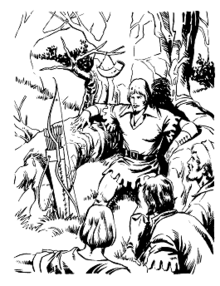


The Merry Men are the group of outlaws who follow Robin Hood in English literature and folklore. The group appears in the earliest ballads about Robin Hood and remains popular in modern adaptations. History The Merry Men are Robin Hood's group who work to rob from the rich and give to the poor. They have antagonized the tyrannical rule of Prince John while King Richard is fighting in the Crusades. This also puts them into conflict with Prince John's minions, Guy of Gisbourne and the Sheriff of Nottingham.
The early ballads give specific names to only three companions: Little John, Much the Miller's Son, and William Scarlock or Scathelock, the Will Scarlet of later traditions. Joining them are between 20 and "seven score" (140) outlawed yeomen. The most prominent of the Merry Men is Robin's second-in-command, Little John. He appears in the earliest ballads, and is mentioned in even earlier sources, such as Andrew of Wyntoun's Orygynale Chronicle of around 1420 and Walter Bower's expansion of the Scotichronicon, completed around 1440. Later ballads name additional Merry Men, some of whom appear in only one or two ballads, while others, like the minstrel Alan-a-Dale and the jovial Friar Tuck, became fully attached to the legend. Several of the Robin Hood ballads tell the story of how individual Merry Men join the group; this is frequently accomplished by defeating Robin in a duel.
The phrase "merry man" was originally a generic term for any follower or companion of an outlaw, knight, or similar leader.[1] Robin's band are called "mery men" in the oldest known Robin Hood ballad, "Robin Hood and the Monk",[2] which survives in a manuscript completed after 1450.[3]
Several modern adaptations add a member to the group who is a MoororSaracen: